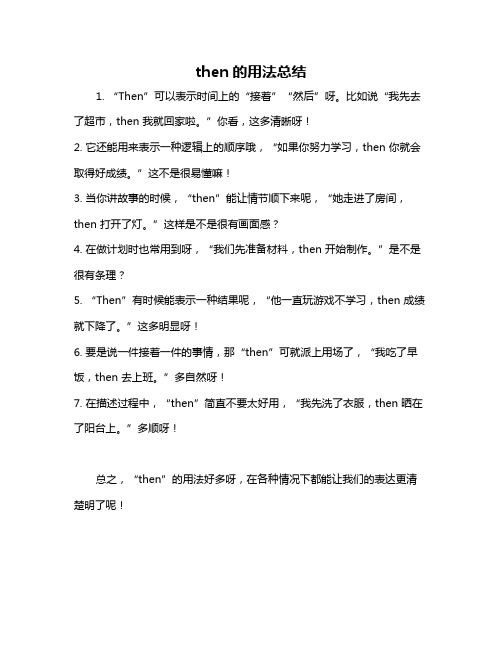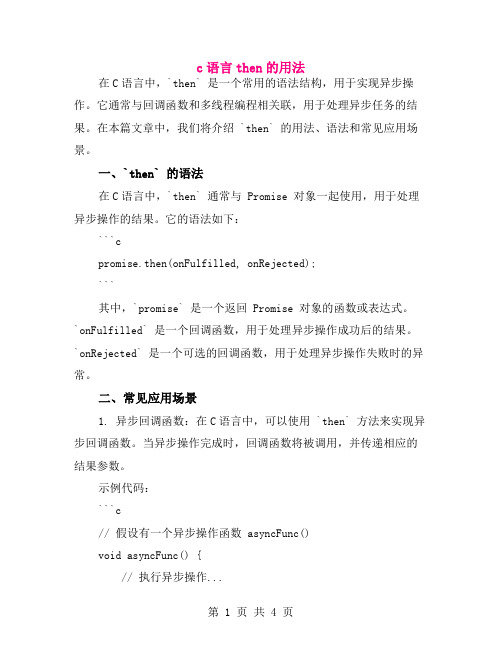then的用法简介
then引导的倒装句

如何理解和使用then引导的倒装句一、then引导的倒装句的定义倒装句是指把谓语或谓语的一部分放在主语之前的句子,分为完全倒装和部分倒装两种。
完全倒装是指把整个谓语动词都放在主语之前,部分倒装是指只把助动词、情态动词或be动词放在主语之前。
then是一个副词,表示“那时,然后,于是,因此”等意思,可以用来引导倒装句,表示时间、顺序或结果的关系。
then 引导的倒装句通常有以下几种情况:then放在句首,表示“那时”,用于叙述过去的事情,常用一般过去时的完全倒装,如:Then came the chairman. 这时总裁来了。
Then followed a long silence. 接着是一阵长久的沉默。
then放在句首,表示“然后”,用于叙述一系列的动作或事件,常用一般现在时或一般过去时的完全倒装,如:Then comes your turn. 现在轮到你了。
Then up went the arrow into the air. 箭直射向空中。
then放在句首,表示“于是,因此”,用于表达因果关系,常用一般现在时或一般过去时的部分倒装,如:Then did he realize his mistake. 他这才意识到自己的错误。
Then will you be able to succeed. 你这样才能成功。
二、then引导的倒装句的用法then引导的倒装句的用法主要有以下几点:then引导的倒装句可以用来强调then所表示的时间、顺序或结果,使句子更加生动、有力或紧凑,如:Then came the storm. 风暴随之而来。
Then did she burst into tears. 她这才哭了起来。
then引导的倒装句可以用来避免重复主语或谓语,使句子更加简洁、流畅或对称,如:He was a teacher, and then became a writer. 他曾是一名教师,后来成了一名作家。
then的用法简介

then的用法简介篇一:then用法小议then用法小议1.用作副词,表示“那时”,可用于过去或将来。
如:hewasinparisthen.那是他在巴黎。
hewillbefreethen.那时他就会有空了。
注:有时可用于某些介词后。
如:hewillhaveleftbythen.到那时他就会已经离开了。
Fromthenonheworkedharder.从此以后,他工作更努力了。
2.表示“然后”、“接着”,通常与连词and连用。
如:Let’sgoforadrinkandthengohome.我们先去喝一杯,然后再回家。
hewenttoparis,andthentoLondon.他到了巴黎,后又到了伦敦。
注:在口语中有时可不用连词and而只用then。
另外,有时位于句首,其后用倒装句。
如:Thencamethedayofhisexam.接着他考试的那一天到了。
3.表示“那么”、“既然是那样”、“这么说来”,通常用于句首或句末。
如:Yousayyoudon’twanttobeateacher.Thenwhatdoyouwanttobe?你说你不想当老师,那么你想干什么呢?ThenyoumeantosayIamacheat.那么你的意思是说我是个骗子。
注:有时与条件或时间状语从句搭配使用。
如:(from)Ifit’snotonthetable,thenitwillbeinthedrawer.要是不在桌上,那就是抽屉里。
whenIknowwhatreallyhappened,thenIshallbeabletodecide.当我知道事实真相后,我就可以作决定了。
初三课文:unit14mainlyrevisionA:wherehaveJimandKategone?A:吉姆和凯特去哪儿了?b:They'vegonetoLondon.b:他们去伦敦了。
A:havetheyeverbeentherebefore?A:他们以前去过那儿吗?b:ofcourse.Theylivedthere.b:当然了。
then的用法总结

then的用法总结
1. “Then”可以表示时间上的“接着”“然后”呀。
比如说“我先去了超市,then 我就回家啦。
”你看,这多清晰呀!
2. 它还能用来表示一种逻辑上的顺序哦,“如果你努力学习,then 你就会取得好成绩。
”这不是很易懂嘛!
3. 当你讲故事的时候,“then”能让情节顺下来呢,“她走进了房间,then 打开了灯。
”这样是不是很有画面感?
4. 在做计划时也常用到呀,“我们先准备材料,then 开始制作。
”是不是很有条理?
5. “Then”有时候能表示一种结果呢,“他一直玩游戏不学习,then 成绩就下降了。
”这多明显呀!
6. 要是说一件接着一件的事情,那“then”可就派上用场了,“我吃了早饭,then 去上班。
”多自然呀!
7. 在描述过程中,“then”简直不要太好用,“我先洗了衣服,then 晒在了阳台上。
”多顺呀!
总之,“then”的用法好多呀,在各种情况下都能让我们的表达更清楚明了呢!。
and和then的用法的区别

and和then的用法的区别一、and和then的基本用法在英语中,and和then都是常见的连词,用来连接不同的句子或短语。
虽然它们都可以表示顺序关系,但它们在使用上有着一些区别。
1. and的用法作为一个连词,and主要用于连接两个相似的事物、行动或概念。
它起到并列的作用,将两个或多个元素合并在一起,并表达它们之间存在密切关系。
例如:- I like coffee and tea.我喜欢咖啡和茶。
- He is tall and intelligent.他又高又聪明。
- She bought bread, milk, and cheese at the grocery store.她在杂货店买了面包、牛奶和奶酪。
2. then的用法then也是一个连词,通常用于表示时间顺序或因果关系。
它强调按照特定的次序或某种逻辑发生的事情。
例如:- First, we finished our homework; then, we went out to play.首先,我们完成了作业;然后我们出去玩。
- If it rains tomorrow, then we will stay indoors.如果明天下雨,那么我们会呆在室内。
二、and和then所蕴含的意义差异尽管and和then都可用于表达顺序关系,但它们所蕴含的意义有着一些区别。
下面从逻辑性、时间性和因果性三个方面来探讨这些差异。
1. 逻辑性差异and表示两个或多个元素具有相似特征或者属于同一类别,它们是并列的关系。
而then则强调按照特定的逻辑顺序发生或执行事情。
在这一点上,then更加强调前后的因果关系。
2. 时间性差异and不涉及时间概念,它只是简单地表达两者共存的事实。
而then则侧重于表示事件之间的先后次序,常用于叙述事件发生的顺序。
3. 因果性差异and通常用于表达并列的概念或动作,没有明显的因果关系。
然而,then表示一个事件或行为是由前面发生的事情导致的结果。
when then用法

when then用法"when"和"then"都是英语中常用的词汇,有各自的用法。
以下是它们的用法解释:1."When" 是一个关系副词,常用于引导时间状语从句,表示在某个时间点或者条件下发生的情况。
例如:- I will go to the beach when it stops raining. (当雨停下来时,我会去海滩。
)- She was studying English when I called her. (我给她打电话时,她正在学习英语。
)2."Then"也可以用作一个副词,有多种用法:- 表示时间的连续:常用于表示接下来或者紧接着的动作或情况。
例如:- First, we will prepare the ingredients. Then, we can start cooking. (首先,我们会准备好材料。
接着,我们可以开始烹饪。
)- I finished my work, and then I went home. (我完成了工作,然后我回家了。
)- 表示因果关系:表示前面发生的事情导致或者引起后面发生的事情。
例如:- If you study hard, then you will pass the exam.(如果你努力学习,那么你就会通过考试。
)- 表示那个时候、那时候:表示过去发生的事情。
例如:- I was young back then.(那时候我还年轻。
)总结起来,"when" 引导时间状语从句,表示某个时间点或条件下发生的情况,而"then"主要表示接下来、因果关系或表示过去的时间。
它们在不同的语境中有不同的用法,请根据上下文来确定正确的使用方式。
c语言then的用法

c语言then的用法在C语言中,`then` 是一个常用的语法结构,用于实现异步操作。
它通常与回调函数和多线程编程相关联,用于处理异步任务的结果。
在本篇文章中,我们将介绍 `then` 的用法、语法和常见应用场景。
一、`then` 的语法在C语言中,`then` 通常与 Promise 对象一起使用,用于处理异步操作的结果。
它的语法如下:```cpromise.then(onFulfilled, onRejected);```其中,`promise` 是一个返回 Promise 对象的函数或表达式。
`onFulfilled` 是一个回调函数,用于处理异步操作成功后的结果。
`onRejected` 是一个可选的回调函数,用于处理异步操作失败时的异常。
二、常见应用场景1. 异步回调函数:在C语言中,可以使用 `then` 方法来实现异步回调函数。
当异步操作完成时,回调函数将被调用,并传递相应的结果参数。
示例代码:```c// 假设有一个异步操作函数 asyncFunc()void asyncFunc() {// 执行异步操作...}// 在主程序中调用 asyncFunc() 并使用 then 方法处理结果asyncFunc().then(function(result) {// 处理异步操作成功后的结果printf("异步操作成功,结果为:%d", result);}).catch(function(error) {// 处理异步操作失败时的异常printf("异步操作失败,异常信息:%s", error.message);});```2. 多线程编程:在C语言中,可以使用 `then` 方法来实现多线程编程。
通过将异步操作放在不同的线程中执行,并使用 `then` 方法来处理结果,可以实现并发和并行处理。
示例代码:```c// 假设有两个异步操作函数 asyncFunc1() 和 asyncFunc2()void asyncFunc1() {// 执行异步操作...}void asyncFunc2() {// 执行另一个异步操作...}// 在主程序中创建两个线程,并使用 then 方法处理结果void* threadFunc(void* arg) {asyncFunc().then(function(result) {// 处理第一个异步操作的结果printf("第一个异步操作结果:%d", result);});return NULL;}void* thread2Func(void* arg) {asyncFunc2().then(function(result) {// 处理第二个异步操作的结果printf("第二个异步操作结果:%d", result);});return NULL;}int main() {pthread_t thread1, thread2;pthread_create(&thread1, NULL, threadFunc, NULL); pthread_create(&thread2, NULL, thread2Func, NULL); pthread_join(thread1, NULL);pthread_join(thread2, NULL);return 0;}```三、总结通过以上介绍,我们可以看到 `then` 在C语言中的用法和常见应用场景。
then的用法简介

then 的用法简介 篇一:then 用法小议 then 用法小议 1. 用作副词,表示“那时”,可用于过去或将来。
如: He was in Paris then. 那是他在巴黎。
He will be free then. 那时他就会有空了。
注:有时可用于某些介词后。
如: He will have left by then. 到那时他就会已经离开了。
From then on he worked harder. 从此以后,他工作更努力了。
2. 表示“然后”、“接着”,通常与连词 and 连用。
如: Let’s go for a drink and then go home. 我们先去喝一杯,然后再回家。
He went to Paris, and then to London. 他到了巴黎,后又到了伦敦。
注:在口语中有时可不用连词 and 而只用 then。
另外,有时位于句首,其后用倒装句。
如: Then came the day of his exam. 接着他考试的那一天到了。
3. 表示“那么”、“既然是那样”、“这么说来”,通常用于句首或句末。
如: You say you don’t want to be a teacher. Then what do you want to be? 你说你不想当老师, 那么你想干什么呢? Then you mean to say I am a cheat. 那么你的意思是说我是个骗子。
注:有时与条件或时间状语从句搭配使用。
如:(from ) If it’s not on the table, then it will be in the drawer. 要是不在桌上,那就是抽屉里。
When I know what really happened, then I shall be able to decide. 当我知道事实真相后,我 就可以作决定了。
then的用法简介

then的用法简介一、Introducing the Usage of "Then"When we delve into mastering a language, it's important to understand not only its grammar and vocabulary but also the diverse ways in which words can be used. In this article, we will explore the different uses and applications of the word "then."1. Sequential OrderThe primary usage of "then" is to denote a sequential order of events or actions. In this context, "then" is often used as an adverb or conjunction. For example:- First, I will prepare dinner; then, I will clean the kitchen.- She finished reading her book; then, she closed her eyes and drifted off to sleep.2. Consequence or Result"Then" can also express a consequence or result that follows from a previous action or event. It indicates cause and effect and is usually used as an adverb or conjunction. Consider these examples:- If you don't study for your test, then you might fail.- He didn't complete his project on time; then, he had to face the consequences.3. Time AdverbAnother common use of "then" is as a time adverb, particularly in relation to past events. In this case, it refers to a point in time that is not now but was previously mentioned or understood from context:- We went to Spain last year. Back then, travel restrictions were less strict.- She worked at a coffee shop back then but has since become a successful businesswoman.4. Alternative in Conditional StatementsIn conditional statements or hypothetical situations with two possible outcomes, "then" can be used as an alternative to expressing the consequence or result:- If it rains tomorrow, then we will stay indoors.- Study hard for your exams; if you do so consistently, then you'll see improvement in your grades.5. Consequently/ThereforeIn some cases, "then" can act as a synonym for "consequently" or "therefore." It signals an inevitable outcome or logical conclusion:- The team lost their star player to an injury; then, their performance significantly declined.- She failed to submit her assignment on time; then, she received a lower grade than expected.6. In that CaseAdditionally, "then" can be used to express a situation resulting from something previously mentioned and serves as a transitional phrase or connector:- If you need help with your homework, then feel free to ask me.- You want to become fluent in Mandarin? Join a language class, and then practice with native speakers whenever possible.7. Expressing Chronological OrderLastly, "then" can be used to explicitly express chronological order or the unfolding of events:- First, we had breakfast; then, we went for a walk in the park; finally, we returned home.二、ConclusionIn summary, the word "then" has versatile applications in English. It is primarily used to indicate sequential order or consequence but also functions as a time adverb and an alternative in conditional statements. Furthermore, it can signify logical conclusions and serve as a transitional phrase. By understanding the various uses of "then," learners can enhance their conversational and writing skills while conveying ideas effectively.。
- 1、下载文档前请自行甄别文档内容的完整性,平台不提供额外的编辑、内容补充、找答案等附加服务。
- 2、"仅部分预览"的文档,不可在线预览部分如存在完整性等问题,可反馈申请退款(可完整预览的文档不适用该条件!)。
- 3、如文档侵犯您的权益,请联系客服反馈,我们会尽快为您处理(人工客服工作时间:9:00-18:30)。
then的用法简介
篇一:then用法小议
then用法小议
1. 用作副词,表示“那时”,可用于过去或将来。
如:
He was in Paris then. 那是他在巴黎。
He will be free then. 那时他就会有空了。
注:有时可用于某些介词后。
如:
He will have left by then. 到那时他就会已经离开了。
From then on he worked harder. 从此以后,他工作更努力了。
2. 表示“然后”、“接着”,通常与连词and 连用。
如:
Let’s go for a drink and then go home. 我们先去喝一杯,然后再回家。
He went to Paris, and then to London. 他到了巴黎,后又到了伦敦。
注:在口语中有时可不用连词and 而只用then。
另外,有时位于句首,其后用倒装句。
如:
Then came the day of his exam. 接着他考试的那一天到了。
3. 表示“那么”、“既然是那样”、“这么说来”,通常用于句首或句末。
如:
You say you don’t want to be a teacher. Then what do you want to be? 你说你不想当老师,那么你想干什么呢?
Then you mean to say I am a cheat. 那么你的意思是说我是个骗子。
注:有时与条件或时间状语从句搭配使用。
如:(from )
If it’s not on the table, then it will be in the drawer. 要是不在桌上,那就是抽屉里。
When I know what really happened, then I shall be able to decide. 当我知道事实真相后,我就可以作决定了。
初三课文:Unit 14 Mainly revision
A: Where have Jim and Kate gone?
A:吉姆和凯特去哪儿了?
B: They've gone to London.
B:他们去伦敦了。
A: Have they ever been there before?
A:他们以前去过那儿吗?
B: Of course. They lived there.
B:当然了。
他们曾经住在那儿。
A: When did they live there?
A:他们什么时候住在那儿?
B: They lived there before they came to China.
B:在他们来中国前。
A: Are they going to return soon?
A:他们很快就回来吗?。
